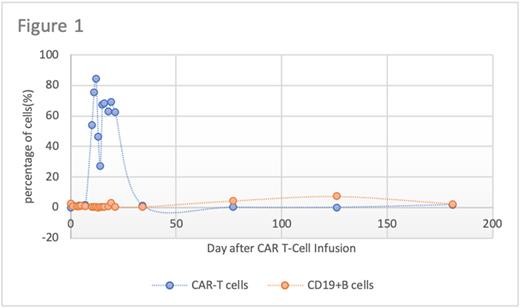Abstract
Background: Systemic sclerosis is a connective tissue disease characterized by multi-organ fibrosis, with B-cell dysfunction and antibody deposition as important causative factors and a poor prognosis. Although drugs or therapeutic approaches including CD20 monoclonal antibodies and autologous stem cell transplantation have shown some efficacy in treating this disease, there remains a significant unmet medical need. Chimeric antigen receptor T cells targeting CD19 as a breakthrough novel immunotherapy can effectively eliminate CD19+ B cells with promising efficacy in hematologic malignancies and systemic lupus erythematosus. Therefore, we aimed to investigate the efficacy and safety of CD19+ CAR-T cells in patients with systemic sclerosis.
Method: This is a registered investigator-initiated, open, single-arm phase I clinical trial(NCT05085444). The enrollment criteria were patients with refractory systemic sclerosis who had failed to respond to multiple drug treatments. Peripheral blood mononuclear cells harvested through autologous fresh leukapheresis were transduced by lentivirus to produce CD19+ CAR-T cells. Patients received lymphodepletion chemotherapy with fludarabine (30 mg/m2/day, days -3 to -1) and cyclophosphamide (500 mg/m2/day, days -3 to -2), and 1-3x10^6/kg CD19+ CAR-T cells were transfused on day D0. The levels of CAR-T cells and CD19+ B cells were monitored dynamically by peripheral blood before and after transfusion.
Results: Three patients with refractory systemic sclerosis have received CAR-T cell transfusion until now. The first case is a female with interstitial pneumonia as the main manifestation, and her lung lesions continued to progress during the previous glucocorticoid and CTX treatment. The patient has been followed up for 9 months without any drug treatment, with CAR-T cells being continuously detectable in the peripheral blood. The cough is significantly reduced and the high-resolution CT shows improving of interstitial pneumonia. The other two cases have recently received CAR-T infusion. All three patients have not experienced any adverse events related to CAR T-cell therapy, including cytokine release syndrome, neurotoxicity, or prolonged cytopenia.
Conclusion:CD19+ CAR-T cells showed good safety and efficacy in the treatment of systemic sclerosis, but further studies with expanded samples are needed.
Disclosures
No relevant conflicts of interest to declare.
Author notes
Asterisk with author names denotes non-ASH members.


This feature is available to Subscribers Only
Sign In or Create an Account Close Modal